Overview
Navigating the process of applying for disability benefits can be daunting, especially for those living with bipolar disorder. We understand that you may have questions about your eligibility and the necessary steps to take. This article outlines the essential criteria and documentation required by the Social Security Administration (SSA) to help guide you through this journey.
- A formal diagnosis is a critical first step.
- Alongside this, evidence of significant functional impairment is necessary to demonstrate how bipolar disorder impacts your daily life.
- Comprehensive medical documentation plays a vital role in supporting your application, ensuring that you present a complete picture of your circumstances.
Remember, you are not alone in this process. We’re here to help you understand what’s needed for a successful application and to provide the support you deserve. Take a moment to gather your medical records and reflect on how your condition affects your daily activities. By doing so, you’re taking an important step toward securing the assistance you need.
Introduction
Navigating the complexities of securing disability benefits for bipolar disorder can often feel like an uphill battle. Many individuals may wonder if they truly qualify for the support they need. We understand that this process can be daunting. In this article, we will explore the critical factors that influence the success of a disability claim. We will offer insights into:
- Eligibility criteria
- Documentation requirements
- The nuances of different types of bipolar disorder
As applicants grapple with the challenges of the application process, it's common to feel overwhelmed. What steps can be taken to improve the chances of approval? Together, we can ensure that individuals receive the assistance they rightfully deserve. You're not alone in this journey, and we're here to help guide you through it.
Turnout: Streamline Your Disability Application Process for Bipolar Disorder
Turnout is transforming the application process for individuals with bipolar condition by addressing the question, can you get disability for bipolar benefits. We understand that this journey can be daunting, and by harnessing AI technology, Turnout simplifies the application experience, making it more accessible and less intimidating. Key features such as automated document management and proactive follow-ups allow individuals to focus on their health while Turnout manages the complexities of their cases. This modern approach not only ensures timely support and guidance but also significantly enhances the likelihood of approval.
For those struggling with bipolar condition, one common concern is, can you get disability for bipolar, while navigating the bureaucratic landscape that can feel overwhelming. It’s common to feel lost in the process. Turnout's platform is specifically designed to alleviate this burden, offering a user-friendly experience that empowers you to take charge of your applications and secure the benefits you rightfully deserve. With the integration of AI, the platform is positioned to enhance approval rates by streamlining processes and offering real-time insights into application status. We’re here to foster a more supportive atmosphere for those seeking assistance, ensuring you are not alone in this journey.
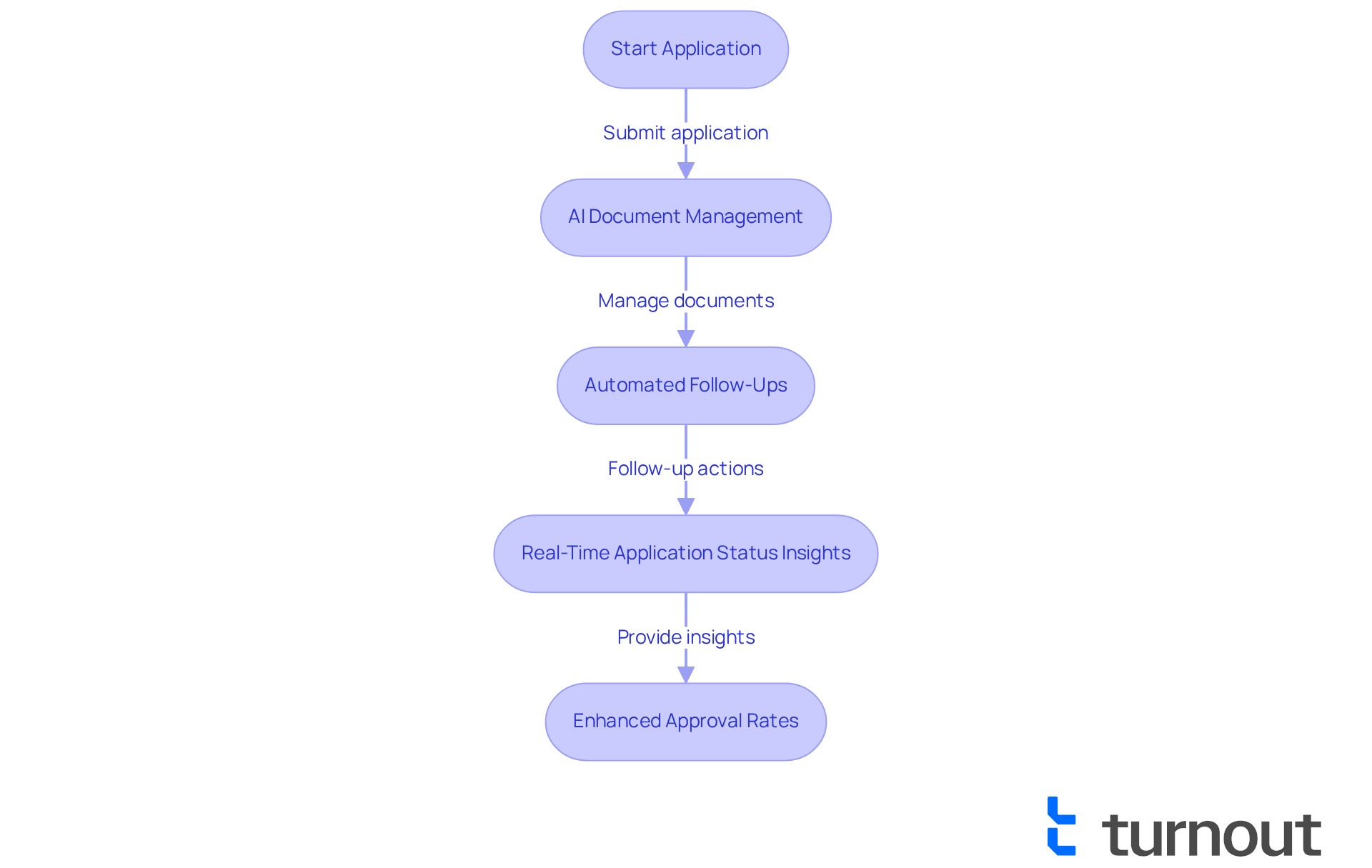
Eligibility Criteria: What You Need to Qualify for Disability with Bipolar Disorder
If you are wondering if you can get disability for bipolar, it's important to understand the specific criteria set by the Social Security Administration (SSA). We recognize that this process can feel overwhelming, but you are not alone in this journey. Here’s what you need to know:
- Diagnosis: A formal assessment from a qualified mental health expert is essential to confirm your bipolar condition.
- Severity: Your condition must significantly hinder your ability to perform essential work activities, such as maintaining focus and managing daily responsibilities.
- Duration: The condition should have lasted or be expected to last at least 12 months.
- Substantial Gainful Activity (SGA): You must not be engaged in substantial gainful activity, which is defined as earning above a certain monthly threshold—currently $1,620 for non-blind individuals.
Turnout offers valuable tools and services to assist you in navigating these complex criteria and the SSD claims process. While we are not a law firm and do not provide legal representation, our trained nonlawyer advocates are here to help you understand your eligibility and prepare your application effectively. Did you know that approximately 29.1% of disabled workers receive benefits due to mental disorders, and you may wonder, can you get disability for bipolar disorder? Understanding these criteria is crucial for evaluating your eligibility and preparing your submission.
Additionally, if your application is approved, you can expect annual reviews to ensure continued eligibility. To strengthen your application, it’s important to gather comprehensive medical records that document your diagnosis, treatment history, and the impact of your symptoms on daily living. We encourage you to reach out to Turnout for guidance on compiling these documents and enhancing your chances of approval. Remember, we’re here to help you every step of the way.
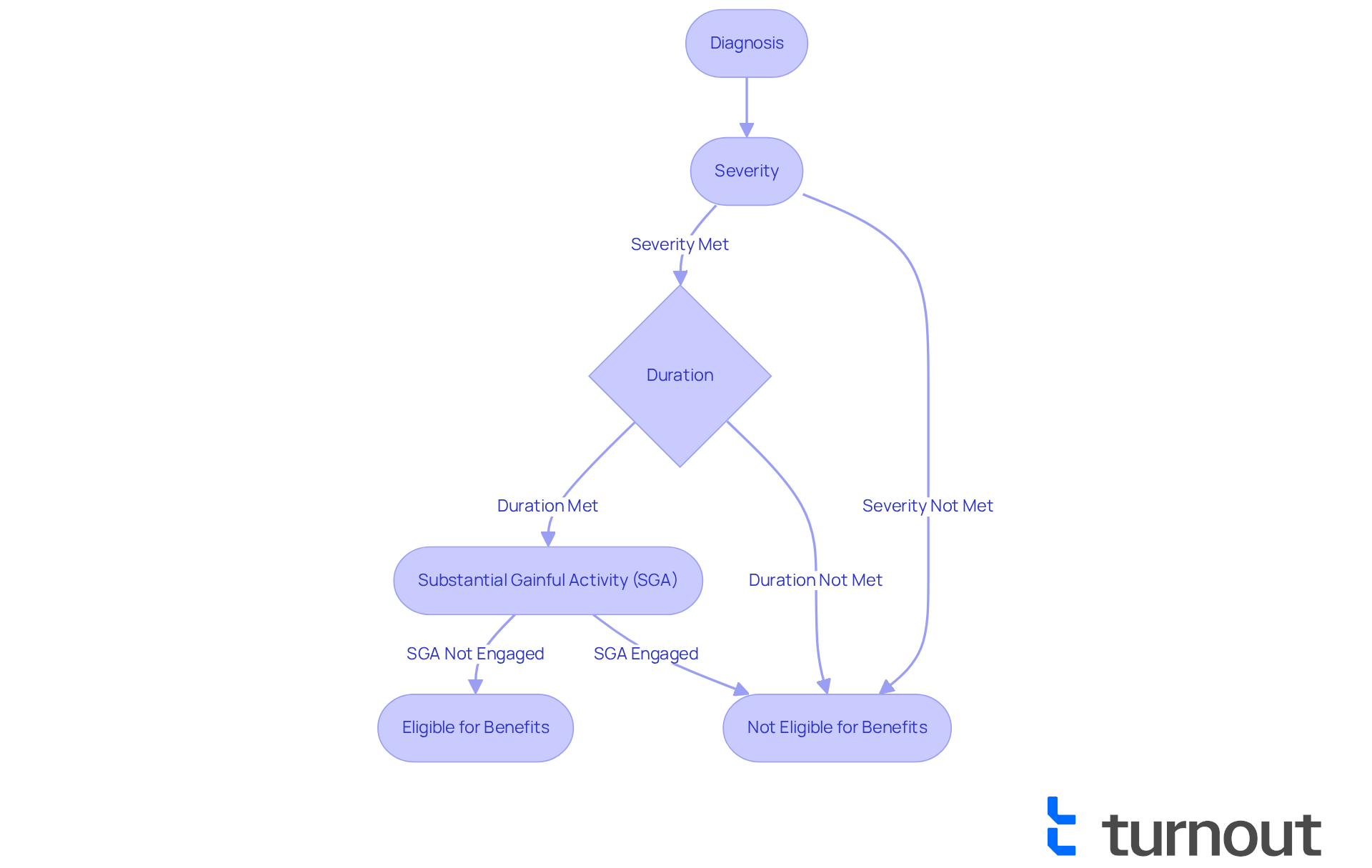
Documentation Requirements: Proving Your Bipolar Disorder Impacts Daily Functioning
When seeking disability benefits, we understand that individuals often wonder, can you get disability for bipolar condition, as they face many challenges. It’s essential to supply extensive documentation to support your claims. Here are some key documents that can help you in this process:
-
Medical Records: Comprehensive records from your healthcare providers are crucial. They should detail your diagnosis, treatment history, and ongoing management of bipolar condition. This includes your medication history, its effectiveness, any side effects, and mental status examinations.
-
Functional Reports: Statements from family members, friends, or caregivers describing how your condition impacts daily activities and social interactions are essential. These reports should illustrate specific limitations in functioning, such as difficulties in maintaining personal hygiene or managing daily tasks.
-
Treatment Plans: Evidence of adherence to your prescribed treatments, including medications and therapy sessions, is vital. Consistent treatment not only backs your assertion but also shows your dedication to managing your condition.
-
Personal Statements: A narrative from you detailing your experiences with bipolar condition and its effect on your capacity to work and function is important. This statement should describe how symptoms manifest in your daily life, including mood fluctuations and whether can you get disability for bipolar, as well as their effects on productivity.
Gathering and organizing these documents is essential for a successful application. They provide the SSA with a clear picture of your condition and its effects on your life. Remember, you are not alone in this journey, and we’re here to help you every step of the way.
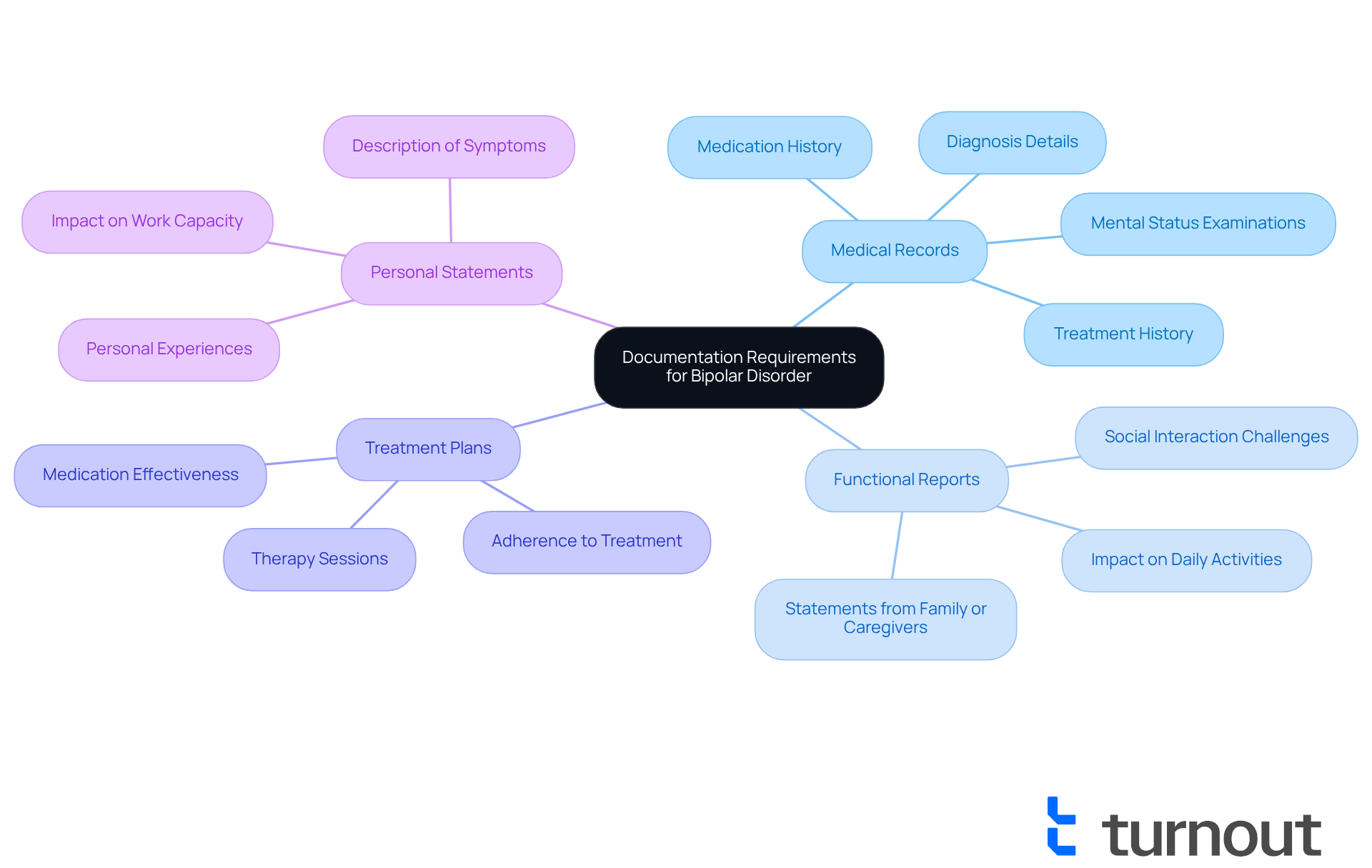
Types of Bipolar Disorder: Understanding Variations and Their Implications for Disability Claims
Bipolar disorder encompasses several types, each with unique characteristics that raise the question of can you get disability for bipolar.
-
Bipolar I Disorder: This type is marked by manic episodes lasting at least seven days or by manic symptoms severe enough to require immediate hospitalization. Many individuals wonder, can you get disability for bipolar, especially since depressive episodes often accompany manic phases, significantly affecting their ability to function in a work environment.
-
Bipolar II Disorder: Characterized by a pattern of depressive episodes and hypomanic episodes, this condition does not involve the full-blown manic episodes typical of Bipolar I. The milder characteristics of the manic episodes can complicate the evaluation of impairment requests, as the effect on work capacity may differ.
-
Cyclothymic Disorder: A milder form of bipolar disorder, cyclothymic disorder involves numerous periods of hypomanic symptoms and periods of depressive symptoms lasting for at least two years. While the symptoms are less severe, they can still disrupt daily functioning and work capacity.
Recognizing these differences is essential for applicants, as the seriousness and regularity of occurrences can greatly influence the evaluation of whether can you get disability for bipolar. We understand that navigating this process can be overwhelming. For example, the Social Security Administration indicates that to understand if you can get disability for bipolar, symptoms need to be persistent and medically recorded to be eligible for benefits. This highlights the significance of thorough medical documentation in substantiating requests. Furthermore, individuals with Bipolar I may encounter greater difficulties in demonstrating their limitations due to the severity of their symptoms compared to those with Bipolar II or cyclothymic conditions. This nuanced understanding can assist you in maneuvering through the intricacies of the impairment application process more efficiently. Remember, you are not alone in this journey, and we’re here to help.
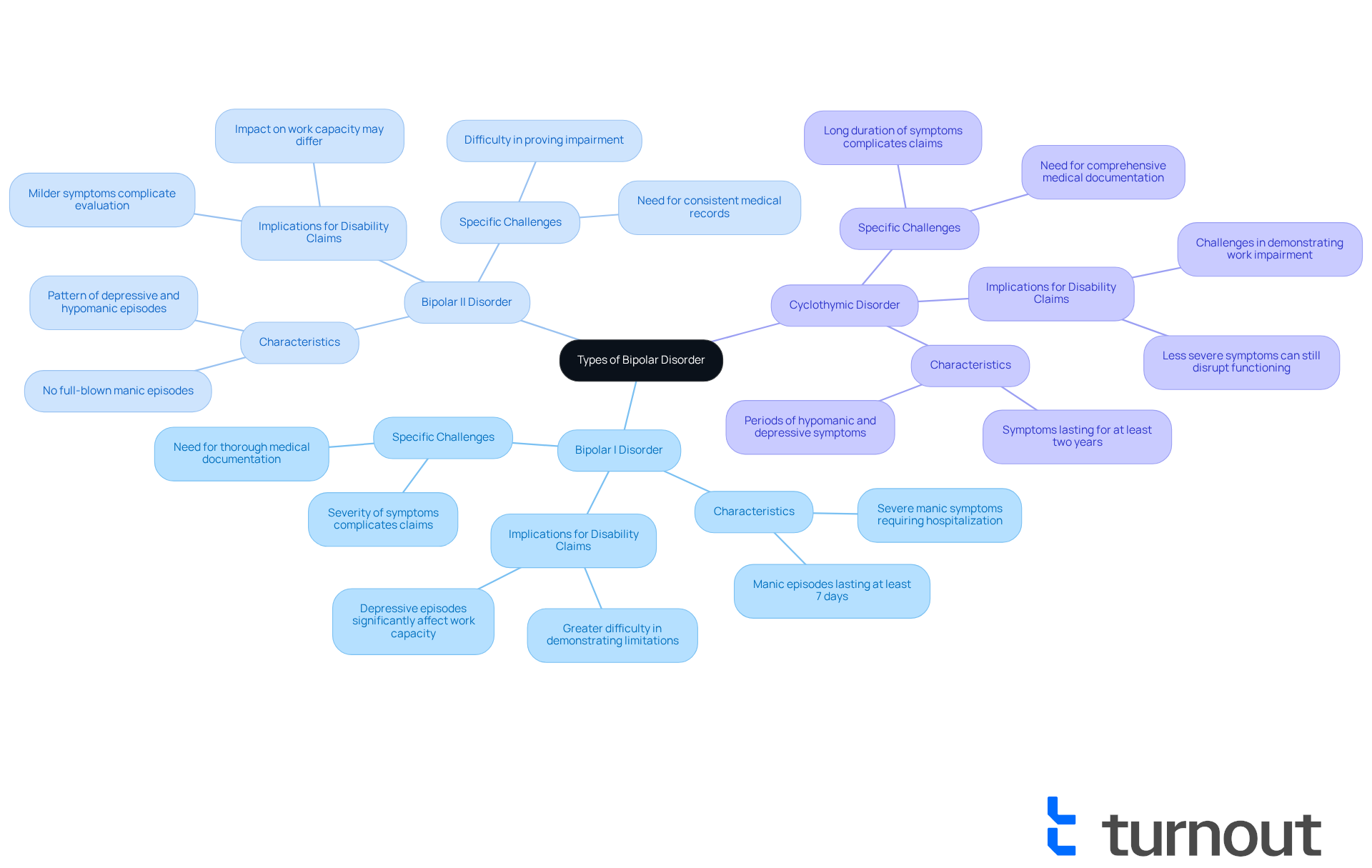
Medical Statements: How Healthcare Providers Can Support Your Disability Claim
Healthcare providers play a vital role in supporting claims for disability for bipolar condition. We understand that navigating this process can be challenging, and your concerns are valid. To assist effectively, their medical statements should include:
- Diagnosis Confirmation: Clear documentation of the bipolar condition diagnosis, including the type and severity.
- Treatment History: A detailed account of the treatment plan, including medications prescribed, therapy sessions attended, and any hospitalizations.
- Functional Limitations: An evaluation of how the condition restricts the person's capacity to carry out everyday activities and job-related tasks.
- Prognosis: An evaluation of the expected duration of the disorder and its potential impact on the individual's future functioning.
These statements provide essential evidence to the SSA, aiding in establishing the validity of the request and the necessity for benefits. As stated by the Health Insurance Association of America, around 30% of individuals aged 35 to 65 will experience a disability lasting a minimum of 90 days. This statistic emphasizes the significance of comprehensive documentation in these instances.
Mental health professionals emphasize that well-crafted medical statements can significantly influence the approval process, particularly in cases where one might ask, can you get disability for bipolar? For instance, a statement that clearly outlines the severity of symptoms and their impact on daily life can help answer the question, can you get disability for bipolar, and enhance the chances of a successful claim. As mentioned by a mental health specialist, 'Detailed medical statements are essential; they not only confirm the diagnosis but also demonstrate the real-world effects of the condition on the patient's life.'
Effective medical statements often include specific examples of how bipolar disorder affects the individual's daily functioning, including considerations on whether you can get disability for bipolar, such as difficulties in maintaining employment or managing personal relationships. A case study showed that individuals who submitted thorough medical documentation were more likely to obtain approval for their requests. This highlights the necessity for healthcare providers to be diligent in their reporting.
By providing detailed and accurate information, healthcare providers can help ensure that individuals receive the support they need. A practical suggestion for healthcare professionals is to organize their medical statements by clearly connecting each component to the person's daily struggles. This approach forms a persuasive narrative that reinforces the assertion. Remember, you're not alone in this journey; we're here to help you every step of the way.
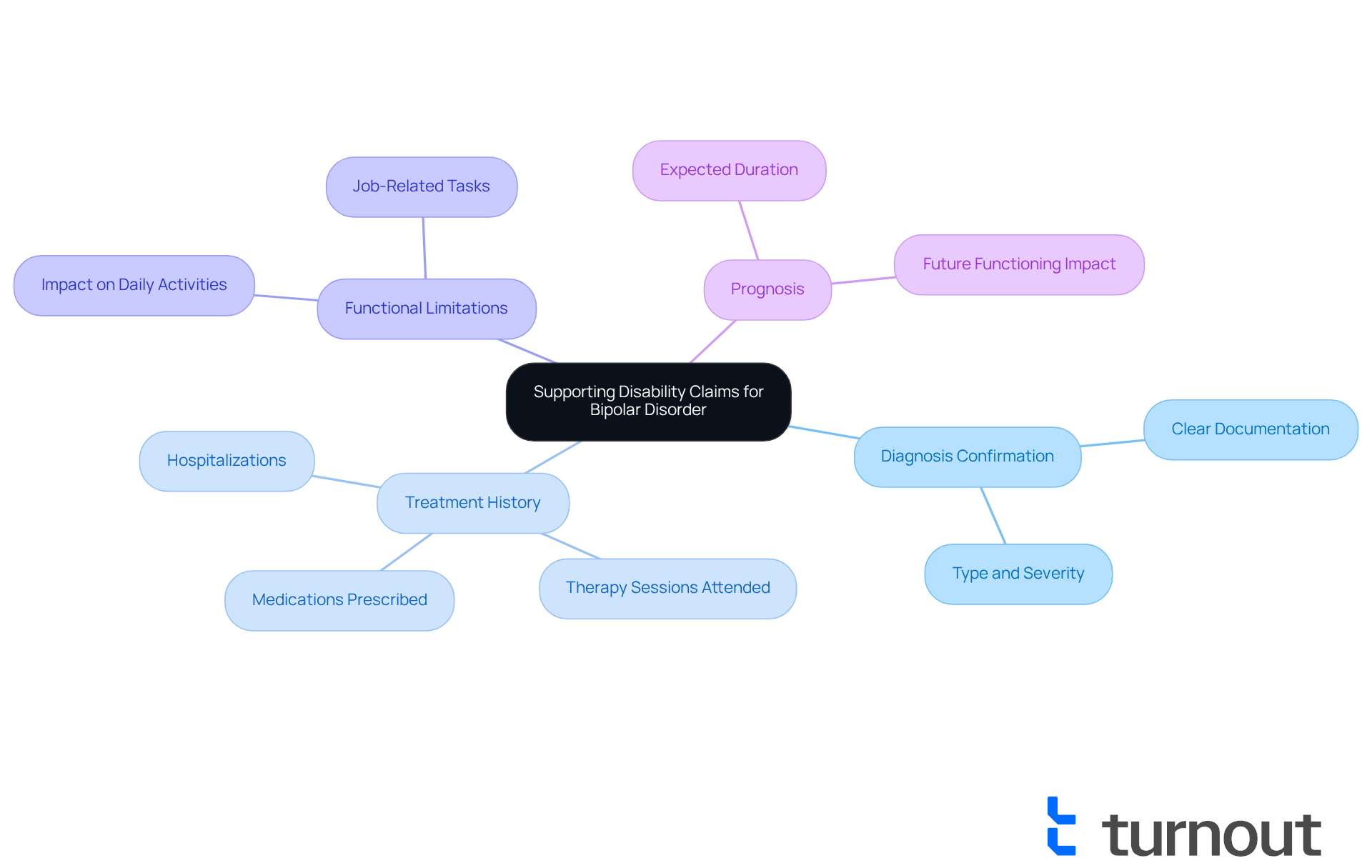
Legal Assistance: How Advocates Can Help You Secure Disability Benefits for Bipolar Disorder
Navigating the disability application process can be a daunting experience, especially for individuals who are asking, can you get disability for bipolar disorder? We understand that this journey can feel overwhelming, but Turnout is here to help. Our trained nonlawyer advocates provide invaluable support by:
- Guiding the Application Process: We assist applicants in understanding the essential steps and paperwork needed for a successful request, ensuring you are well-informed about the SSD process.
- Preparing for Interviews: Our advocates help individuals get ready for any interviews or evaluations required by the SSA, which can be vital for your requests.
- Reviewing Documentation: We ensure that all medical records and personal statements are complete and accurately reflect your condition, which is crucial for a favorable outcome.
- Appealing Denials: If your claim is denied, we offer support and strategies to appeal, increasing your chances of securing the benefits you may qualify for.
It’s important to note that Turnout is not a law firm and does not provide legal advice. However, having an advocate from Turnout can significantly enhance your ability to navigate the complexities of the disability system. Remember, you are not alone in this journey, and we are dedicated to helping you access the financial support you deserve.
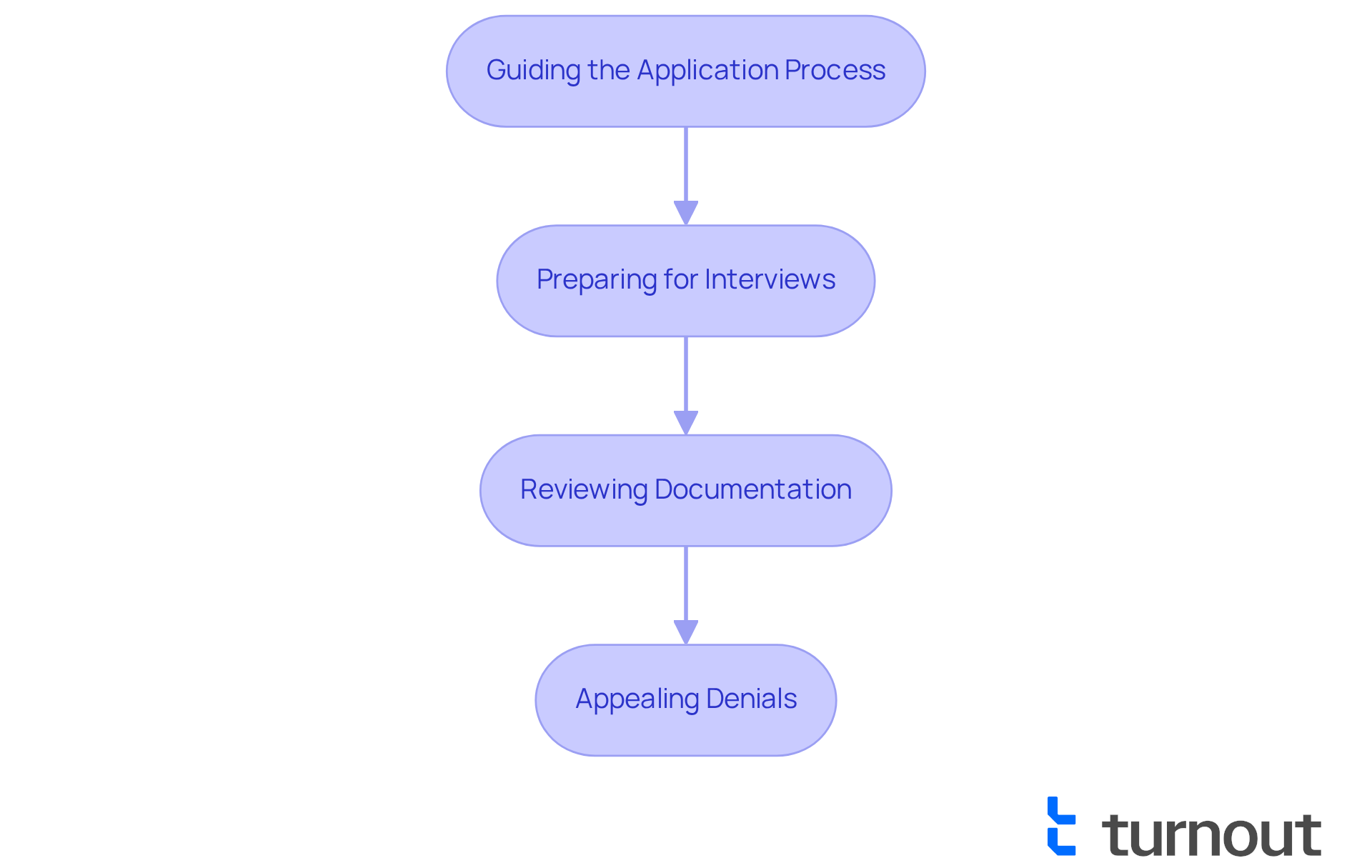
SSA Blue Book: Key Impairments for Bipolar Disorder and Disability Eligibility
The SSA Blue Book serves as a vital resource that outlines the criteria for various impairments, specifically addressing the question of can you get disability for bipolar condition. Understanding this resource is essential for applicants navigating their journey. Here are some key points to consider:
- Listing 12.04: Bipolar disorder falls under this listing. It requires evidence of both manic and depressive episodes that significantly impair daily functioning.
- Severity Requirements: To qualify, individuals must demonstrate extreme limitations in at least one of four areas of mental functioning: understanding, interacting with others, concentrating, and adapting.
- Documentation Standards: The Blue Book specifies the types of medical evidence needed to substantiate a request, highlighting the importance of thorough documentation.
We understand that comprehending the Blue Book can feel overwhelming. However, it directly influences the assessment of submissions and eligibility for benefits. In 2023, mental disorders, particularly mood disorders, accounted for nearly 12% of disability awards. This underscores the importance of meeting the outlined criteria. Successful requests often include documentation that answers the question, can you get disability for bipolar, by providing comprehensive medical records detailing the frequency and intensity of symptoms and their impact on work capacity. Familiarity with these standards can significantly enhance your chances of securing the support you need.
It's important to note that Turnout is not a law firm and does not provide legal advice. However, we are here to offer vital assistance in navigating the SSD claims process. Our trained non-legal advocates can help you understand these standards and gather the necessary documentation. This supportive approach can greatly improve your chances of obtaining the assistance you deserve, particularly when considering can you get disability for bipolar condition. Remember, you are not alone in this journey; we are here to help.
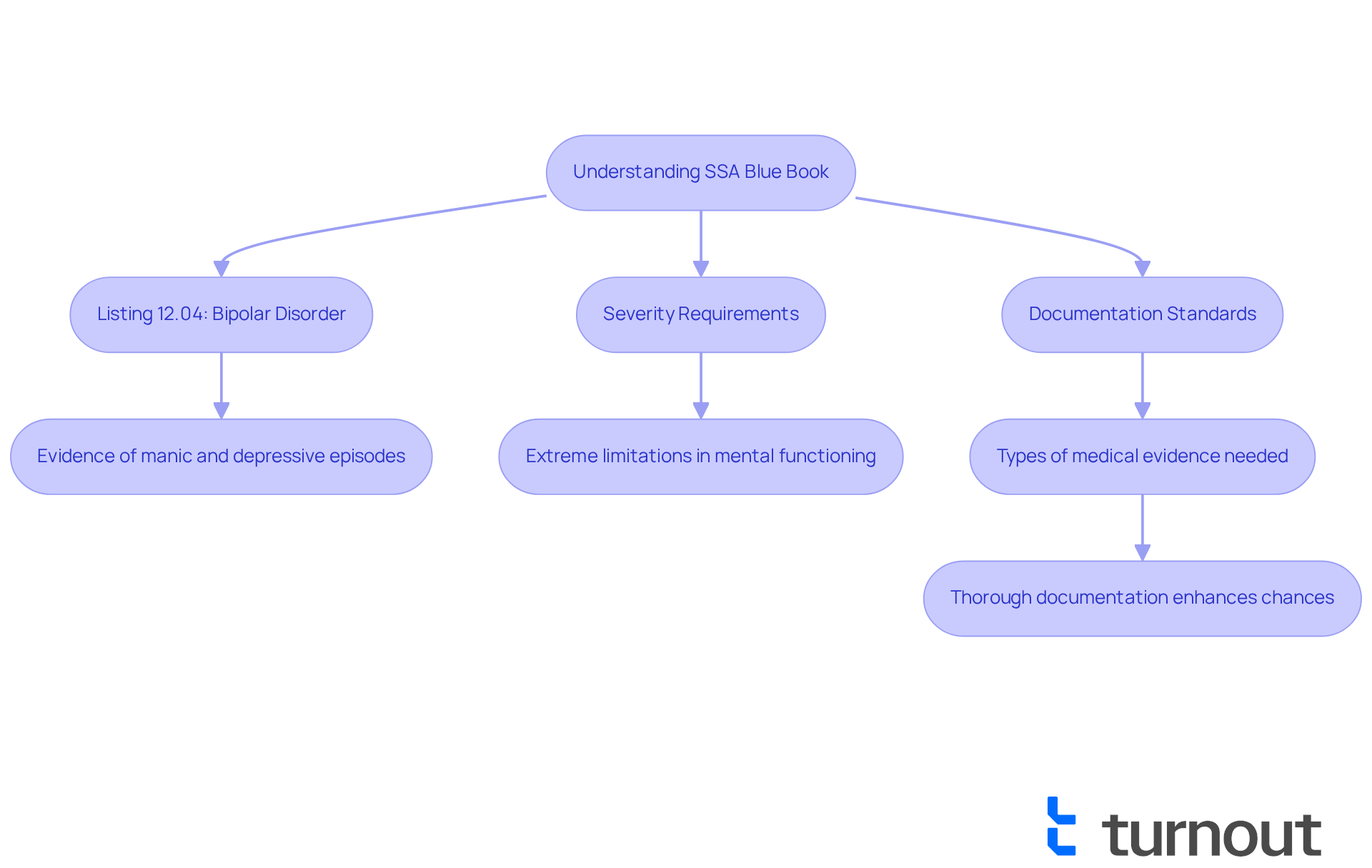
Long-Term Disability Benefits: What to Expect When Applying with Bipolar Disorder
Applying for long-term disability benefits can raise the question of whether you can get disability for bipolar disorder, which can feel overwhelming. We understand that navigating this process involves several key factors that are crucial to your journey:
-
Application Timeline: The process can take several months. Initial reviews often lead to requests for additional information, extending the timeline even further. As of November 2023, new candidates waited an average of 225 days for a decision on their benefits application related to disabilities.
-
Ongoing Evaluations: It's common to undergo periodic assessments to determine continued eligibility for benefits. These evaluations ensure that your condition remains severe enough to warrant support.
-
Benefit Amounts: The amount you may receive depends on your work history and the severity of your condition. The Social Security Administration (SSA) uses specific calculations to determine eligibility, and keep in mind that there is a five-month waiting period from the official start date of your condition before SSDI payments commence.
-
Possible Rejections: Unfortunately, around 79% of initial submissions are denied. This means it’s essential to be prepared to contest if needed. Most SSDI applications are initially denied, with only 21 percent of first applications approved. Many who appeal may face extended wait times, sometimes exceeding two years for a final decision.
Understanding these elements can help you navigate the long-term challenge process more efficiently. Remember, you are not alone in this journey. Turnout offers access to tools and services that assist consumers in navigating these intricate processes, employing trained non-professional advocates for SSD applications. It’s important to note that Turnout is not a law firm and does not provide legal advice.
As one specialist remarked, 'The question of can you get disability for bipolar disorder arises if you experience symptoms of mania, such as hyperactivity and distractibility, that impact your functional abilities.' This highlights the significance of comprehensive documentation and support throughout your journey. We’re here to help you every step of the way.
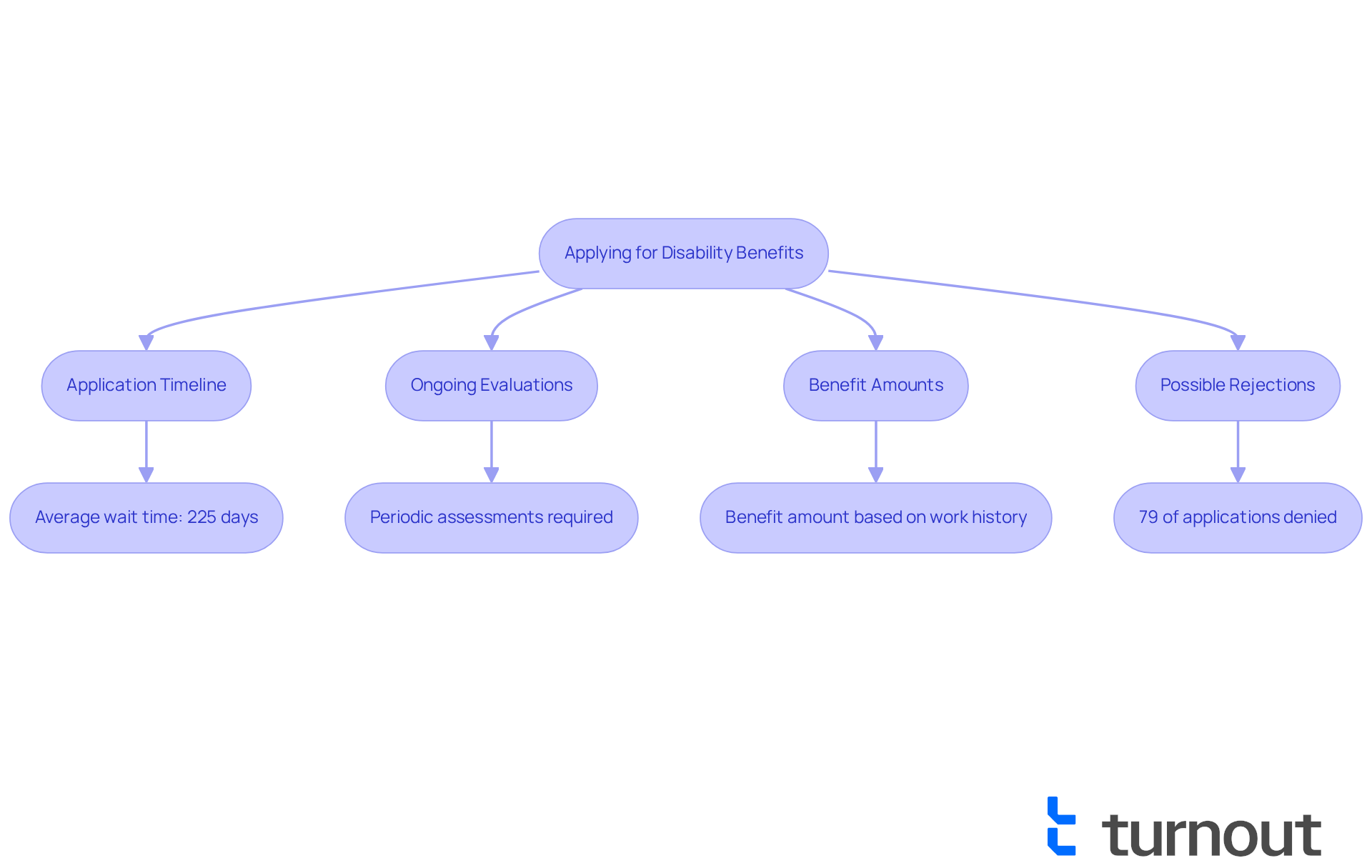
Myths vs. Facts: Debunking Misconceptions About Disability for Bipolar Disorder
Many myths surround the idea of can you get disability for bipolar conditions, and these misconceptions can mislead applicants, potentially hindering their chances of success. Let's explore some common myths together:
-
Myth: Bipolar illness is not a serious condition.
Fact: Bipolar disorder can significantly impair an individual's ability to function and maintain employment, making it a serious mental health issue. -
Myth: You can only qualify for disability if you are hospitalized.
Fact: While hospitalization may strengthen a case, many individuals wonder, can you get disability for bipolar based on documented outpatient treatment and the functional limitations they experience in daily life. -
Myth: All assertions for bipolar disorder are denied.
Fact: Contrary to this belief, many individuals wonder, 'can you get disability for bipolar,' and successfully receive benefits when they provide thorough documentation and support for their requests.
Understanding these myths is essential for applicants. It empowers you to present your assertions with confidence and clarity. We understand that navigating this process can be overwhelming, but mental health advocates emphasize that grasping these realities can lead to improved outcomes. When you understand the process, you are more likely to communicate your situation effectively. Remember, you are not alone in this journey, and we’re here to help.
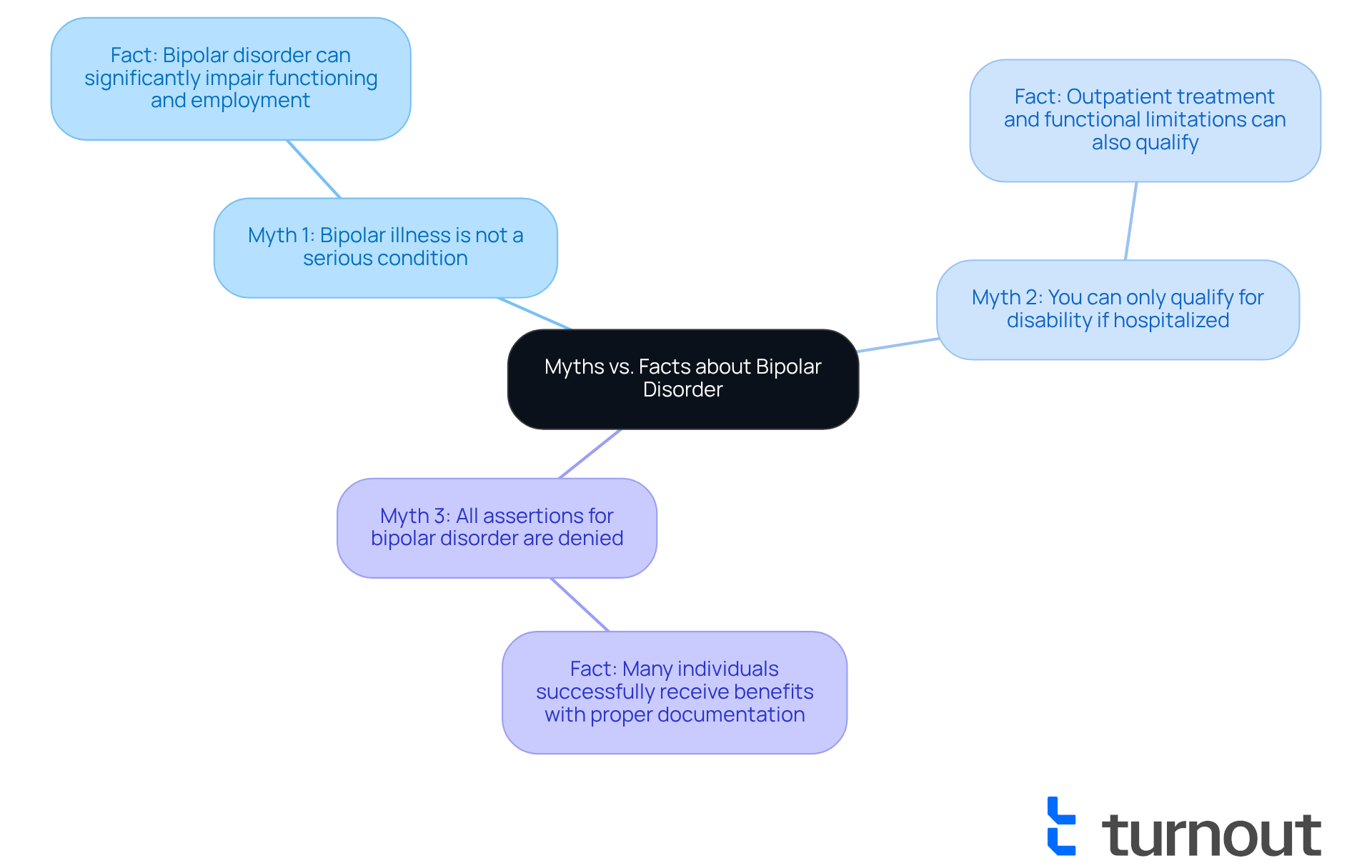
Appeals Process: Steps to Take If Your Bipolar Disability Claim Is Denied
If your disability claim for bipolar disorder is denied, it’s important to know that you’re not alone, and you can take steps to improve your chances of success in understanding can you get disability for bipolar. Here are some essential actions to consider:
- Review the Denial Letter: Take a moment to carefully examine the reasons for the denial. Understanding these reasons is crucial for effectively addressing the issues at hand.
- Request Reconsideration: Remember, you have the right to ask for a reassessment of your case by another examiner within 60 days of receiving the denial. This step is vital and can potentially lead to a different outcome.
- Gather Additional Evidence: It’s beneficial to collect new medical records, treatment notes, or statements from healthcare providers that substantiate your case. This evidence should directly address the reasons for the denial, reinforcing your position.
- Prepare for a Hearing: If your reconsideration request is denied, you can request a hearing before an administrative law judge. This is a valuable opportunity to present your case in person, allowing for a more personal touch in your appeal.
Navigating the appeals process can feel overwhelming, but understanding these steps can significantly enhance your chances of a favorable outcome. While success rates for reconsideration requests can vary, thorough preparation and additional evidence often lead to improved results. Many individuals who have successfully contested bipolar disability requests emphasize the importance of comprehensive medical records and personal accounts, leading to the inquiry of whether can you get disability for bipolar.
At Turnout, we offer support through trained nonlawyer advocates who can assist you in navigating the SSD claims process. It’s important to note that Turnout is not a law firm and does not provide legal advice or representation. By following these steps and leveraging available resources, including Turnout's services, you can effectively advocate for your rights and benefits. Remember, you are not alone in this journey; we’re here to help.
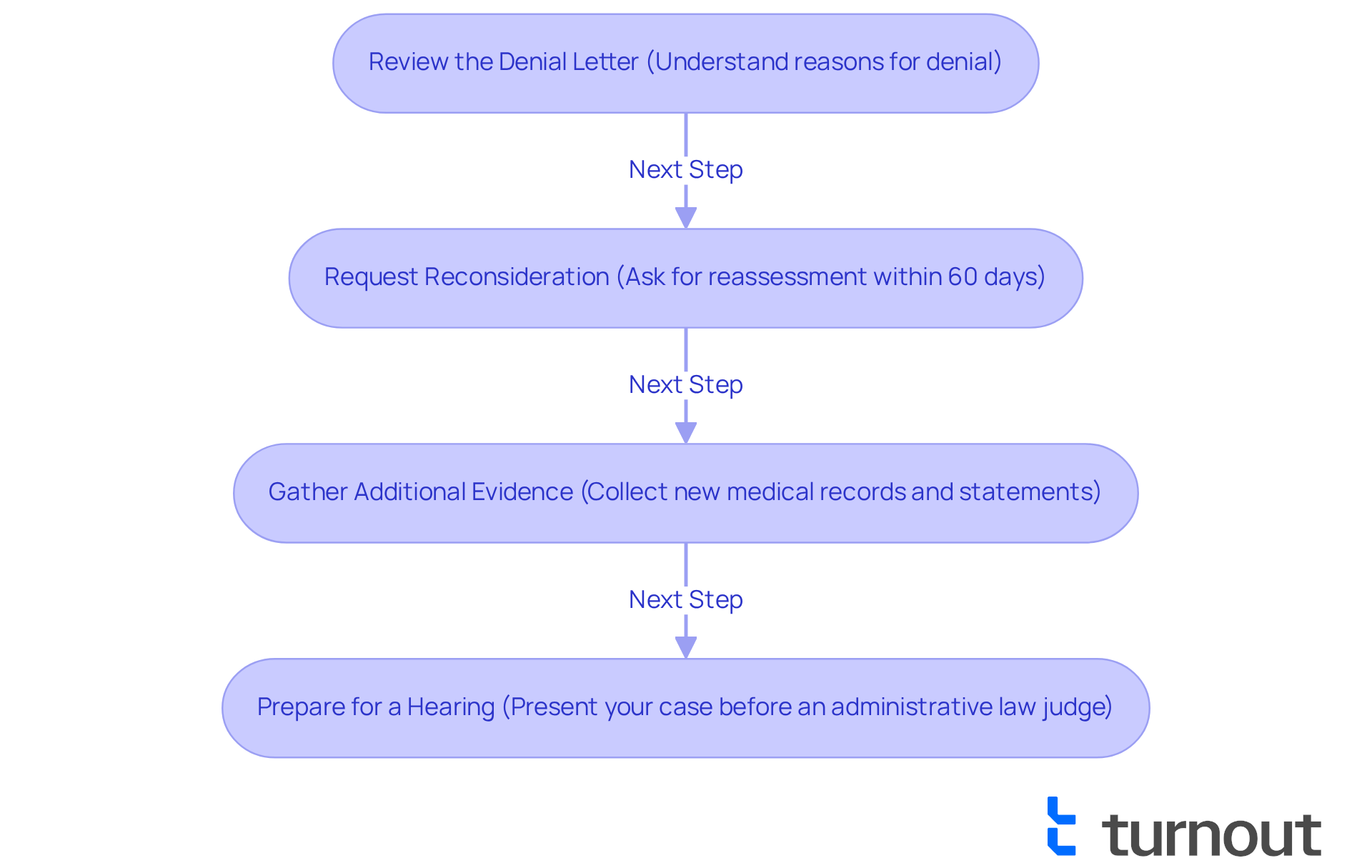
Conclusion
Navigating the complexities of obtaining disability benefits for bipolar disorder can indeed be a challenging journey. We understand that grasping the key factors involved is essential. This article has outlined the critical elements that can influence your eligibility, such as:
- The importance of accurate documentation
- The specific criteria set by the Social Security Administration
- The invaluable role of healthcare providers and advocates in supporting your claim
From the various types of bipolar disorder and their implications for disability claims to the documentation requirements needed to demonstrate the impact on daily functioning, each aspect plays a significant role in determining whether you can qualify for benefits. Additionally, we have debunked common myths that can cloud judgment and hinder the application process. It’s crucial to approach this with a well-prepared mindset to secure the benefits you deserve.
Ultimately, it’s vital to remember that support is available throughout this process. Utilizing resources like Turnout can streamline your application, enhance your understanding of the requirements, and increase your chances of a successful claim. By taking proactive steps and gathering comprehensive documentation, you can effectively advocate for your rights and navigate the challenges of securing disability benefits for bipolar disorder. Remember, you are not alone in this journey—we're here to help.
Frequently Asked Questions
Can I get disability benefits for bipolar disorder?
Yes, individuals with bipolar disorder can qualify for disability benefits if they meet specific criteria set by the Social Security Administration (SSA).
What are the eligibility criteria for disability with bipolar disorder?
The key criteria include having a formal diagnosis from a qualified mental health expert, demonstrating that the condition significantly hinders essential work activities, having the condition last or be expected to last at least 12 months, and not engaging in substantial gainful activity, which is earning above $1,620 per month for non-blind individuals.
What role does Turnout play in the disability application process for bipolar disorder?
Turnout simplifies the application process by using AI technology for automated document management and proactive follow-ups, allowing individuals to focus on their health while Turnout manages the complexities of their cases.
What documentation is required to support a disability claim for bipolar disorder?
Essential documentation includes medical records detailing diagnosis and treatment history, functional reports from family or caregivers, treatment plans showing adherence to prescribed treatments, and personal statements describing how bipolar disorder affects daily functioning.
How can I enhance my chances of approval for disability benefits?
To strengthen your application, gather comprehensive medical records, functional reports, and personal statements that illustrate the impact of your condition on your daily life and ability to work.
What happens if my application for disability benefits is approved?
If approved, you can expect annual reviews to ensure continued eligibility for the benefits.
How does Turnout assist individuals in preparing their applications?
Turnout offers tools and services to help individuals understand their eligibility, compile necessary documents, and navigate the SSD claims process effectively, although they do not provide legal representation.




